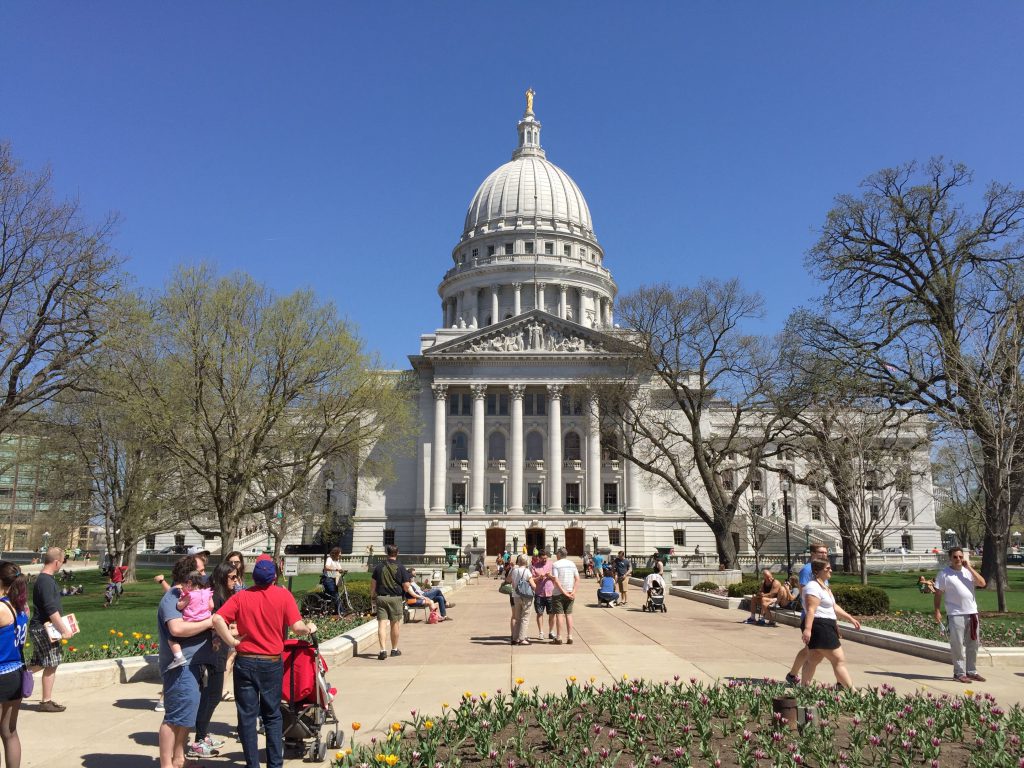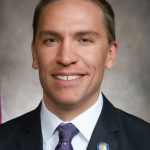Capitol Campaign Spending Records Keep Falling
'The voices of average citizens are being drowned out.'
The statue that Wisconsin erected atop the state Capitol building has her right arm extended in a gesture to symbolize the state motto, “Forward.” But, in this campaign cycle and the last, that right arm could be reaching for record donations required to win an election for a job in that august institution.
Five examples of how dramatically campaign spending is increasing:
One: The April 4 election for the tie-breaking seat on the Wisconsin Supreme Court is on track to be the most expensive election for any judicial seat in the nation. More than $9 million was spent in the run-up to the Feb. 21 primary that narrowed the field of candidates from four to two, and more than $9 million more has already been committed by candidates, state political parties and third-party groups, wispolitics reported last week.
Two: A record $164.2 million was spent on last year’s election for governor that saw incumbent Democrat Tony Evers defeat Republican Tim Michels. That was 77% more than the $93 million spent on the 2018 race between Evers and Republican Gov. Scott Walker, according to the numbers-keeping Wisconsin Democracy Campaign (WDC).
“Evers and the special interest groups that supported him spent an estimated $87.77 million, which was more than the Republican candidates and special interest groups on that side spent,” the WDC reported. “Five Republican candidates and the outside groups that supported them during the primary and general elections spent $75.8 million. The independent candidate for governor and a group that supported her spent $720,173.”
Three: Of the 116 seats in the Legislature up for election last November, spending by candidates and independent groups totaled more than $1 million in 12 of those races, WDC said. And that was for a job as a legislator that pays about $51,000 a year. Total spending in one of those legislative contests – the re-election of Democratic Rep. Steve Doyle, of Onalaska – totaled $2 million, the WDC found. Doyle’s campaign spent $1.1 million; his Republican opponent, Ryan Huebsch, $562,408, and independent groups, $398,121.
Four: A big reason legislative races – especially those with no incumbent – cost so much is because state political parties subsidized their candidates in those 12 seats where total spending exceeded $1 million. The State Democratic Party, for example, gave its candidates for the Legislature $3.9 million; the state Republican Party, $2 million. That $1.9-million gap prompted new Republican Party Chairman Brian Schimming to call state Democratic Party Chair Ben Wikler a “master” at raising cash from out-of-state donors.
Five: Although the number of authorized positions in the Secretary of State’s Office is two – the secretary and one employee – and the job has been systematically stripped of all important functions, spending by seven candidates and independent groups in the November election for that office totaled a record $1.1 million, according to WDC. A recount determined that incumbent Democratic Secretary of State Doug La Follette, whose campaign spent $229,689, was re-elected. The campaign of the Republican who lost, Amy Loudenbeck, spent $501,356, the Democracy Campaign reported. Five independent groups spent $288,824.
Until he retires as Democracy Campaign executive director on July 1, Matt Rothschild will continue pushing for campaign finance reform. In remarks prepared for an Eau Claire event, Rothschild warned that the greatest evil in the current system is “big and dark money in our politics,”
“We’ve got to do something about this problem because the voices of average citizens are being drowned out, and all the outside money from out of state that is coming into Wisconsin calls into question whether we really have self-governance here,” he said, adding:
“Our democracy is not supposed to be a tug-of-war between a handful of billionaires on the right and a handful of billionaires on the left. The super-rich have a much larger say about who gets elected, what laws are passed, and what policies are pursued than the rest of us.”
U.S. Supreme Court decisions “opened the floodgates of big money” in campaigns, Rothschild said. But Walker and Republican legislators doubled the amount – from $10,000 to $20,000 – “rich people could give to their favorite candidates” and removed limits on donations to the state’s political parties, Rothschild noted.
How ironic that donors can now give up $20,000 to candidates for statewide office. That’s what the Wisconsin statue atop the Capitol cost in 1914.
Steven Walters started covering the Capitol in 1988. Contact him at stevenscotwalters@gmail.com
If you think stories like this are important, become a member of Urban Milwaukee and help support real, independent journalism. Plus you get some cool added benefits.
The State of Politics
-
A Wisconsin Political Trivia Quiz
 Dec 15th, 2025 by Steven Walters
Dec 15th, 2025 by Steven Walters
-
The Fight Over Wisconsin’s House Districts
 Dec 8th, 2025 by Steven Walters
Dec 8th, 2025 by Steven Walters
-
The Battle Over On-Line Betting
 Nov 24th, 2025 by Steven Walters
Nov 24th, 2025 by Steven Walters






















